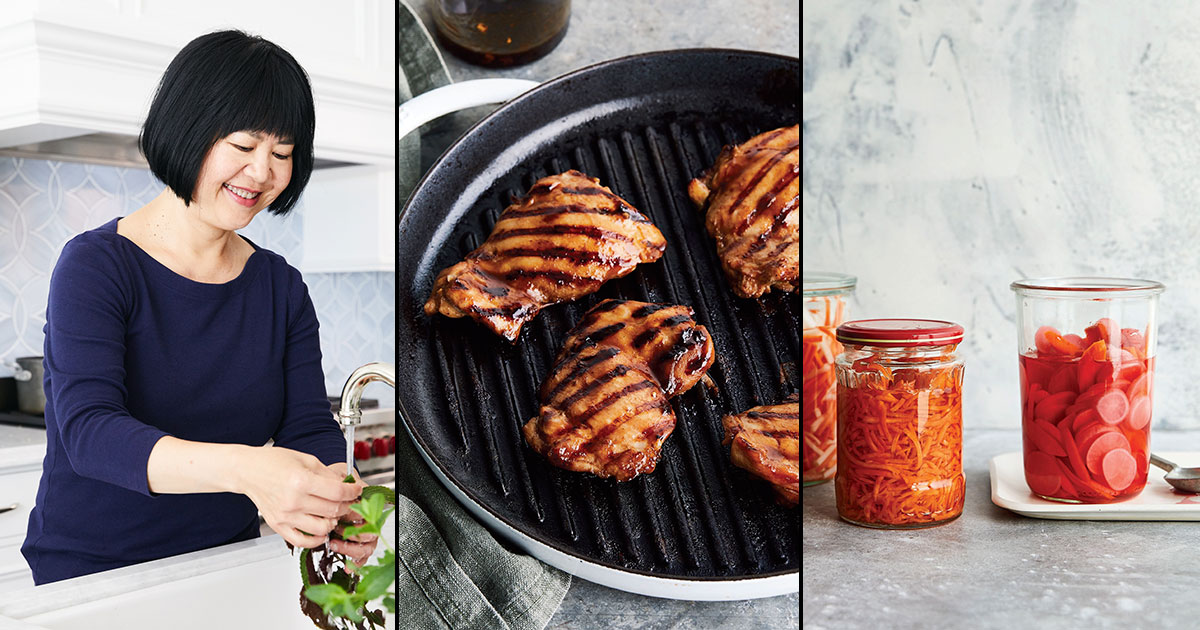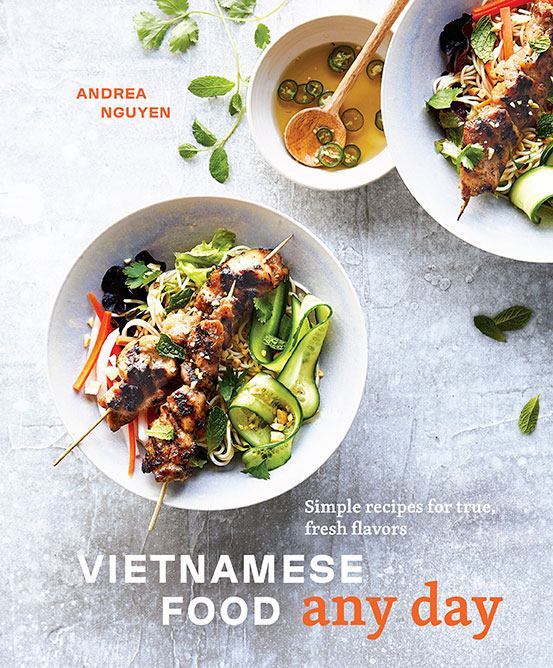Let’s Cook with Andrea Nguyen: Char Siu Chicken and Any Day Viet Pickle
- by Guest

Vietnamese Food Any Day author Andrea Nguyen with Char Siu Chicken and Any Day Viet Pickles | Photos by Aubrie Pick.
We’re inviting some of our trusted nonprofit and Star Chef partners to take over the Bon Appétit blog and share their best tips, recipes, and fun links. This week’s guest curator is Andrea Nguyen, author of the best-selling Vietnamese Food Any Day and others — and a repeat Star Chef partner of Bon Appétit’s, who has shared her recipes and signed cookbooks for hundreds of our guests.
 It’s Memorial Day, and the weather (at least here in the still-sheltering-at-home Bay Area) is perfect for grilling — just like these char siu chicken thighs! Savory-sweet and garlicky Chinese barbecued pork, called char siu in Cantonese and xá xíu in Vietnamese, is hard to resist. Since the classic porky version requires a good hour (better yet, overnight) to marinate, my weeknight approach is to make it with chicken thighs and grill it for a wonderful old-school flavor. You can use a stove-top grill pan as suggested here, or prepare a medium charcoal fire or preheat a gas grill to medium and cook the chicken for 10 to 12 minutes, basting during the last 3 minutes.
It’s Memorial Day, and the weather (at least here in the still-sheltering-at-home Bay Area) is perfect for grilling — just like these char siu chicken thighs! Savory-sweet and garlicky Chinese barbecued pork, called char siu in Cantonese and xá xíu in Vietnamese, is hard to resist. Since the classic porky version requires a good hour (better yet, overnight) to marinate, my weeknight approach is to make it with chicken thighs and grill it for a wonderful old-school flavor. You can use a stove-top grill pan as suggested here, or prepare a medium charcoal fire or preheat a gas grill to medium and cook the chicken for 10 to 12 minutes, basting during the last 3 minutes.
Enjoy char siu chicken for dinner with rice and the Any Day Viet Pickles below, or with a quick stir-fried vegetable or a salad. Use leftovers (or make a double batch) to stuff it into a bánh mì (yes, I know it’s not traditional), a noodle soup, fried rice, or a rice noodle bowl. (I demonstrated making a rice-noodle bowl along with the pickles below for Bon Appétit at Google’s Mountain View headquarters last year — here’s the video.)
Char Siu Chicken
45 minutes. Serves 4.
1.75 pounds boneless, skinless chicken thighs
1 large garlic clove, put through a press or minced and mashed
1/4 teaspoon Chinese five-spice powder
2 tablespoons honey, preferably amber colored
Brimming 2 tablespoons hoisin sauce* (substitution below)
1.5 tablespoons soy sauce
1 tablespoon ketchup
Scant 2 teaspoons toasted sesame oil
Pat the chicken thighs with paper towels to remove excess moisture, then trim and discard any big fat pads. If the thighs are large or super-uneven in thickness, butterfly each one. Lay the thigh, smooth-side down, on your cutting board. Wielding your knife horizontally, slash the big mound of flesh to create a flap of meat, stopping just shy of cutting all the way through. Fold back the meat flap that you just created. The thigh should now be about 50 percent longer and relatively even in thickness. If the result seems awkwardly large, cut it crosswise into two smaller, square-ish pieces. Set aside.
In a large bowl, stir together the garlic, five-spice powder, honey, hoisin, soy sauce, ketchup, and sesame oil. Remove 3 tablespoons and set aside for glazing the chicken. Add the chicken to the bowl, coating the pieces well. Cover with plastic wrap and marinate at room temperature for 30 minutes, or refrigerate up to 24 hours (return to room temperature before cooking).
Lightly oil a cast-iron stove-top grill pan and set over medium-high heat. Add the chicken and cook for 6 to 10 minutes, turning several times. To test for doneness, pierce the flesh with the tip of a knife; the chicken is cooked when clear juices flow out. During the last 2 minutes, when the chicken feels firmish, baste with the reserved marinade to freshen flavor and add sheen. Transfer to a platter and let rest for 5 to 10 minutes before serving.
*If you don’t have hoisin, combine 1 1/2 tablespoons miso (red or yellow) with 1 packed teaspoon light or dark brown sugar and1 teaspoon water. Taste and it should be salty-sweet. With the other ingredients in the marinade, it should work just fine.
Any Day Viet Pickle
10 to 30 minutes, plus 1 hour to marinate. Makes about 3 cups.
Keep this flash pickle around to add color, crunch, and tang to Vietnamese dishes. Simply called đồ chua (“sour stuff”), the daikon and carrot pickle is a banh mi must-have and a perfect side for rice plates and grilled meats. You can substitute turnips or watermelon radish for the daikon; the Notes have more ideas. If the pickle turns stinky as it ages, open the jar and let it air out for 15 minutes before using.
One 1-pound daikon, or two 8-ounce purple-top turnips or watermelon radishes
One 6-ounce carrot
1 teaspoon fine sea salt
2 teaspoons sugar, plus ½ cup
1.25 cups distilled white vinegar (preferably Heinz)
1 cup lukewarm water
Peel and cut the daikon into sticks about 3 inches long and 1/4-inch thick (the width of an average chopstick). Peel and cut the carrot into sticks a little skinnier than the daikon.
Put both vegetables in a bowl and toss with the salt and 2 teaspoons sugar. Massage and knead for 3 minutes, or set aside for 20 minutes, until you can bend a piece of daikon so the tips touch without breaking. They will have lost about a quarter of their original volume.
Rinse the vegetables with water, drain in a mesh strainer or colander, and press or shake to expel excess water. Transfer to a 4-cup jar.
In a medium bowl, stir together the remaining ½ cup sugar with the vinegar and 1 cup water until dissolved. Pour enough of the liquid into the jar to cover the vegetables, discard any excess, and let sit for 1 hour. Use immediately, or refrigerate for up to 1 month.
NOTES
Instead of daikon, use 12 ounces of red radishes. Cut them, unpeeled, into ⅛-inch-thick rounds. Halve the carrot lengthwise, and thinly slice on the diagonal to coax faster pickling. Toss the vegetables in the salt and sugar, let sit for 10 minutes to soften, then rinse and brine as directed.
Don’t like daikon funk? Pickle a 10-ounce package of shredded carrot. Enjoy as is, or mix with sliced green cabbage in a 1:2 ratio of carrot to cabbage, add some of the brine, and season with salt. Let sit for 10 minutes to slightly wilt the cabbage and yield a slaw-like mixture to pair with Viet foods.
Reprinted with permission from Vietnamese Food Any Day: Simple Recipes for True, Fresh Flavors by Andrea Nguyen, copyright © 2019. Published by Ten Speed Press, an imprint of Penguin Random House.
Photography credit: Aubrie Pick © 2019